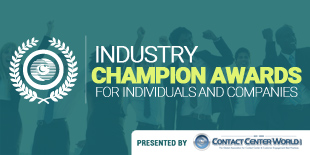NEXTGEN-TV PROGRAMMING
NOW PLAYING
Starting on the hour every hour today
Coming up this Week
The freelance economy, on-demand economy, gig economy, or whatever you want to call it, continues to grow. According to research by McKinsey, the Freelancers Union, and others, freelancers already account for 25% to 36% of the workforce in the US, and the growth rate of this group is three times that of the overall workforce. McKinsey estimates that the gig workforce has the potential to grow from 76M to 129M in the US, and from 89M to 138M in Western Europe, based on their preference for freelance work on a primary or supplemental basis.
The freelance trend is led by millennials--about 47% of them already freelance full-time or part-time, per Freelancers Union. This data point is especially relevant to the contact center workforce, as freelance agents are a useful supplement providing contact centers the ability to easily scale up or down to handle seasonality, event-driven demand, and churn. Millennials and Gen Z already form a large portion of the contact center workforce. Over time, freelancers may indeed become a majority, considering the trends.
Not unlike other CSRs, freelance agents also represent your brand. How can you leverage them without sacrificing service quality and brand equity? We take a look at some best practices for success.
Framework
First, you need to assess your fit for the use of freelance agents. The following framework, based on the complexity and criticality of customer queries, can be a good starting point.
Criticality is an indicator of how high the stakes are. For example, healthcare advice to patients or financial advice to consumers or businesses, are high in criticality. Complexity could be a combination of how difficult the queries are to resolve and how important compliance with regulations is, especially given that penalties for non-compliance could be very high in some industries.
While scenario #1 is a high fit, the need for freelance or in-house agents can be reduced through knowledge and AI-guided automation. While scenario #4 is a misfit for obvious reasons, 2 and 3 require more careful assessment. In the case of 2, technologies such as knowledge management (KM) and AI can help self-service systems get smarter and augment freelance agents so they can handle more complex queries, making it a possible high-fit. In the case of 3, the low level of complexity, combined with hiring more experienced freelancers to account for the high criticality, could make it a high fit. Done right, KM and AI systems can help here, too. Yet another dimension is seasonality—if your business has high seasonality (e.g., retail/e-tail) but relatively low complexity and low criticality, freelance agents can be a good fit in that case as well.
Challenges
While the freelance approach provides flexibility for contact centers, it also comes with challenges. Here are some of the more common ones:
Tips for Success
Here are some proven best practices to elevate freelance reps to the next level of performance and make them your brand ambassadors:
With these best practices, all your service reps—freelance or otherwise—can quickly become as good as your best in-house reps.
About Anand Subramaniam:
Anand Subramaniam is SVP of Marketing for eGain. Prior to eGain, Anand served as an executive in corporate and product marketing, as well as product management and pre-sales roles at companies such as Oracle, Intel and Autodesk as well as startups.
About eGain Corporation: eGain customer engagement platform automates digital-first, omnichannel experiences across all touch points. Powered by AI, machine learning, knowledge, and analytics, our top-rated software optimizes customer journeys with virtual assistance, messaging hub, and desktop to serve customers, reduce cost, and improve compliance.
eGain customer engagement platform automates digital-first, omnichannel experiences across all touch points. Powered by AI, machine learning, knowledge, and analytics, our top-rated software optimizes customer journeys with virtual assistance, messaging hub, and desktop to serve customers, reduce cost, and improve compliance.
![]()
![]()
![]()
![]()
![]()
![]()
![]()
Published: Tuesday, July 3, 2018
NEXTGEN-TV PROGRAMMING
NOW PLAYING
Starting on the hour every hour today
Coming up this Week

 |  Bharat Parshotam Bharat ParshotamHead Direct Delivery Absa |
 |  Aymen Ismail Aymen IsmailHead of Customer Engagement Solutions smart Europe GmbH |
 |  Nathalya Wani Sabu Nathalya Wani SabuExecutive Vice President PT. Bank Central Asia, Tbk |
 |  Bill Quiseng Bill QuisengChief Experience officer Bill Quiseng dot com |
 |  Danny Singer Danny SingerFounder& Chief Product Officer Noetica |
I am checking out all the amazing and daily updated content on ContactCenterWorld.com and networking with professionals worldwide
Send To Friends Post On My Wall